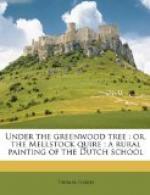“A teacher in a landed family’s nursery, who was foolish enough to marry the keeper of the same establishment; for I was only a keeper then, though now I’ve a dozen other irons in the fire as steward here for my lord, what with the timber sales and the yearly fellings, and the gravel and sand sales and one thing and ’tother. However, d’ye think Fancy picked up her good manners, the smooth turn of her tongue, her musical notes, and her knowledge of books, in a homely hole like this?”
“No.”
“D’ye know where?”
“No.”
“Well, when I went a-wandering after her mother’s death, she lived with her aunt, who kept a boarding-school, till her aunt married Lawyer Green—a man as sharp as a needle—and the school was broke up. Did ye know that then she went to the training-school, and that her name stood first among the Queen’s scholars of her year?”
“I’ve heard so.”
“And that when she sat for her certificate as Government teacher, she had the highest of the first class?”
“Yes.”
“Well, and do ye know what I live in such a miserly way for when I’ve got enough to do without it, and why I make her work as a schoolmistress instead of living here?”
“No.”
“That if any gentleman, who sees her to be his equal in polish, should want to marry her, and she want to marry him, he sha’n’t be superior to her in pocket. Now do ye think after this that you be good enough for her?”
“No.”
“Then good-night t’ee, Master Dewy.”
“Good-night, Mr. Day.”
Modest Dick’s reply had faltered upon his tongue, and he turned away wondering at his presumption in asking for a woman whom he had seen from the beginning to be so superior to him.
CHAPTER III: FANCY IN THE RAIN
The next scene is a tempestuous afternoon in the following
month, and
Fancy Day is discovered walking from her father’s
home towards Mellstock.
A single vast gray cloud covered the country, from which the small rain and mist had just begun to blow down in wavy sheets, alternately thick and thin. The trees of the fields and plantations writhed like miserable men as the air wound its way swiftly among them: the lowest portions of their trunks, that had hardly ever been known to move, were visibly rocked by the fiercer gusts, distressing the mind by its painful unwontedness, as when a strong man is seen to shed tears. Low-hanging boughs went up and down; high and erect boughs went to and fro; the blasts being so irregular, and divided into so many cross-currents, that neighbouring branches of the same tree swept the skies in independent motions, crossed each other, or became entangled. Across the open spaces flew flocks of green and yellowish leaves, which, after travelling a long distance from their parent trees, reached the ground, and lay there with their under-sides upward.




